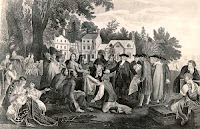 |
| Colonial Quakers |
The Society of Friends, commonly called Quakers, is a religious body distinguished by mystical devotion, rejection of ritual and formalism, the use of silence in worship, refusal to sanction violence and war, and earnest support of humanitarian and benevolent causes. Quakerism began in England with George Fox (1624-91), who repudiated the creeds, ceremonies, and clergy of all the churches and, while respecting Scripture as giving information about the teaching of Jesus and the beliefs and practices of the early church, held that spiritual individuals are guided by the "inward light" of the Holy Spirit. He and his followers were persecuted for these peculiarities and because they opposed war, civil oaths, payment of tithes for the established church, and the customary forms of respect toward magistrates. Fox founded similar groups in Europe and won followers there. William Penn, a Quaker, received a large grant of land in America, in payment of a debt from the crown to his father, Admiral Penn, and brought colonists from England and the continent to Pennsylvania. He founded Philadelphia in 1682. Though they themselves were persecuted elsewhere, the Quakers granted religious liberty where they were in control. The Hicksite faction (with Unitarian leanings and strict insistence on doctrinal freedom for each individual) separated in 1827. The Wilburite secession (1845) was in the interest of closer adherence to the original Friends' customs. Friends were leaders in opposition to slavery, in fair treatment of the Indians, in humanitarian effort during the Civil War, and in relief work in and between the two World Wars.

